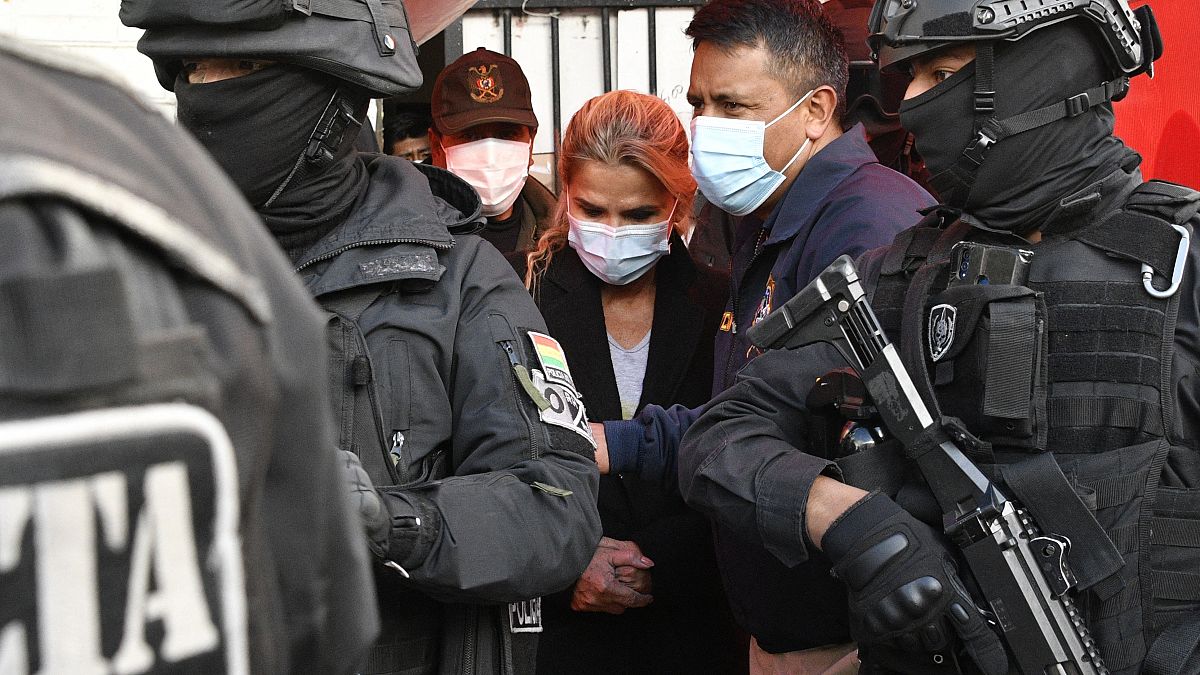Jeanine Anez, the conservative interim president who led Bolivia for a year, was arrested on Saturday and released after questioning.
The conservative interim president who led Bolivia for a year, was arrested on Saturday and released shortly afterwards.
Jeanine Anez was released after being questioned by the public prosecutor in the capital La Paz.
Officials of the restored leftist government are pursuing people they believe were involved in ousting socialist leader Evo Morales from power in 2019.
Other arrest warrants have been issued for more than a dozen other former officials. They include several ex-cabinet ministers, as well as former military leader William Kaliman and the police chief who had urged Morales to resign in 2019.
Anez had been detained in her hometown of Trinidad and was then flown to the capital, La Paz.
"This is an abuse," she told reporters after her appearance at the public prosecutor's office. "There was no coup d'etat, but a constitutional succession."
From a police cell in La Paz, Anez called on the Organization of American States and the European Union to send missions to Bolivia to evaluate what she called "an illegal detention."
Her arrest and the arrest warrants for others has further worsened political tensions in Bolivia.
It's already been torn by a cascade of perceived wrongs suffered by both sides. Morales' detractors contend that he had grown more authoritarian with nearly 13 years in office, that he illegally ran for a fourth re-election and then allegedly rigged the outcome.
By contrast, his supporters allege that right-wing forces led violent protests that prompted security forces to push him into resigning. They then supposedly cracked down on his followers, who themselves protested the alleged coup.
Dozens of people were killed in a series of demonstrations against and then for Morales, who was Bolivia's first indigenous leader.
"This is not justice,'' said former President Carlos Mesa, who has finished second to Morales in several elections. "They are seeking to decapitate an opposition by creating a false narrative of a coup to distract from a fraud.''
Morales, meanwhile, sent a tweet saying, "The authors and accomplices of the dictatorship should be investigated and published."
The Americas director of Human Rights Watch, Jose Miguel Vivanco, said from Washington that the arrest warrants against Anez and her ministers "contain no evidence whatsoever that they have committed the crime of terrorism."
The UN Secretary General's spokesperson tweeted that the rule of law should be observed.
After Morales resigned — or was pushed — and flew abroad, many of his key supporters also resigned. Anez, a legislator who had been several rungs down the ladder of presidential succession, was vaulted into the interim presidency.
Once there, she abruptly wrenched Bolivia's policies to the right and her administration tried to prosecute Morales and an array of his supporters on terrorism and sedition charges, alleging election rigging and oppression of protests.
But Morales' Movement Toward Socialism remained popular. It won last year's elections with 55 per cent of the vote under his chosen candidate Luis Arce, who took the presidency in November. Anez had dropped out after plunging in the polls.


